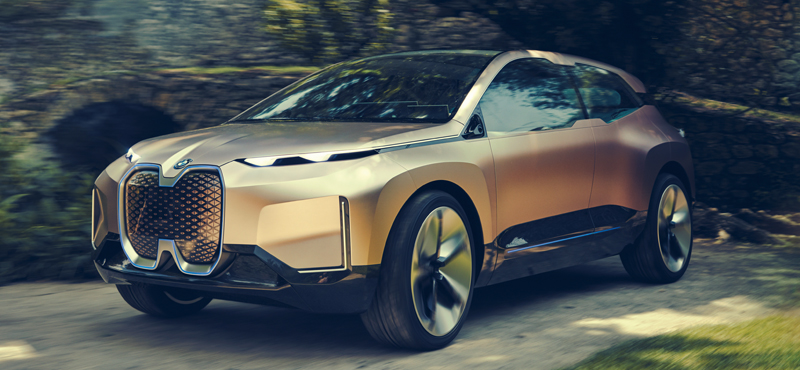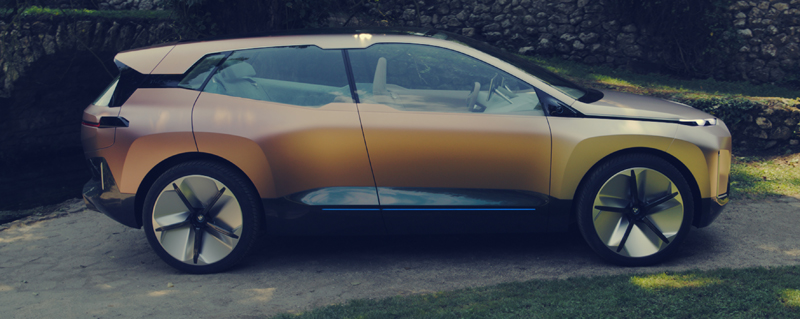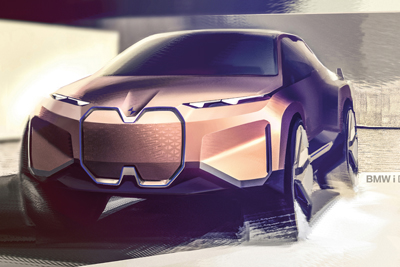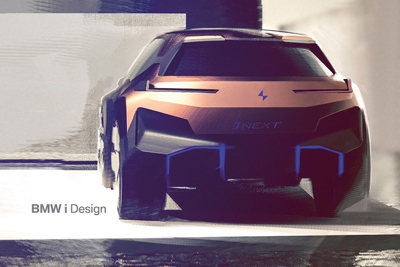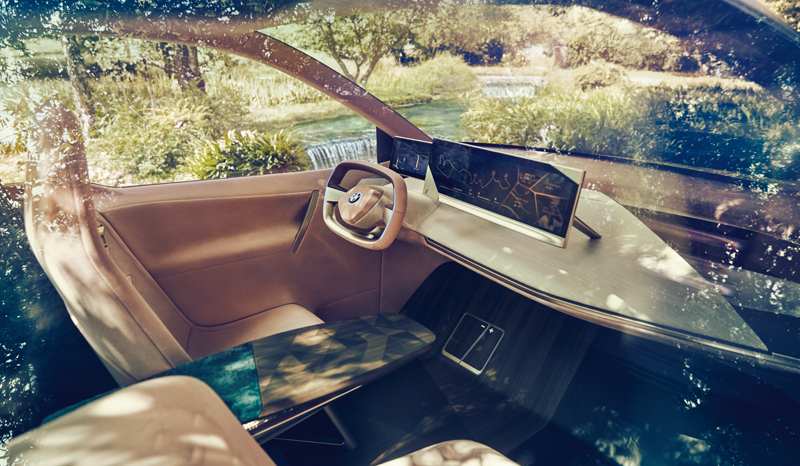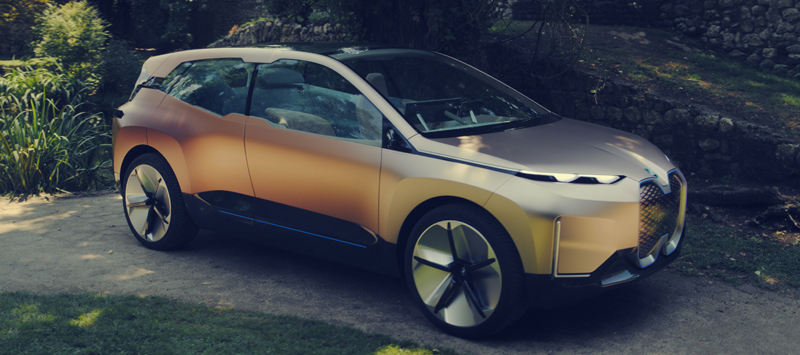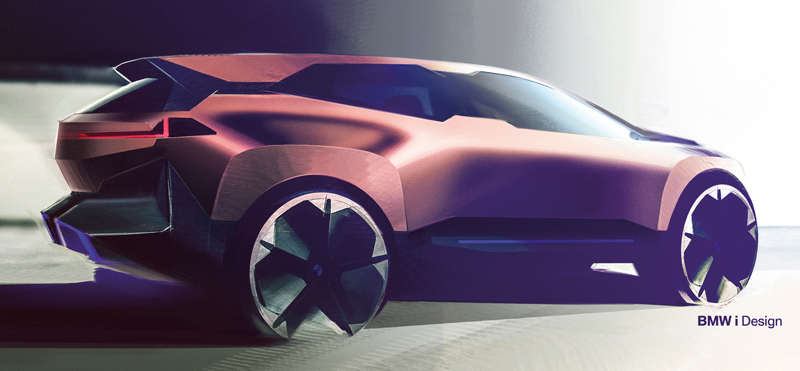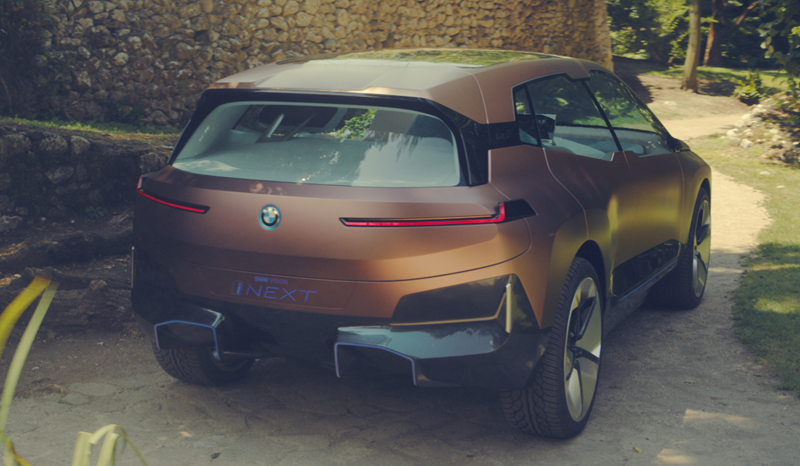BMW VISION iNEXT Electric Concept 2018
iNEXT– the building blocks for the future of the BMW Group.At the BMW AG Annual General Meeting, Harald Krüger, Chairman of the Board of Management at the BMW Group, described iNext as follows: “The iNEXT project will provide our building blocks for the future, from which the entire company and all of its brands are set to benefit.”iNEXT addresses the big question that is at the heart of the BMW Group’s day-to-day work: “How will we be moving around in future?” iNEXT builds resolutely on the idea that first took shape in 2007 with “project i” and evolved into the launch of the BMW i3 in 2013. The BMW Group has already achieved a great deal on this front: it now has over ten years of experience with electric mobility under its belt in both small-scale and large-scale production, the BMW i models are being improved all the time, and their technology is being employed to gradually electrify models from the BMW and MINI ranges. The next step now is the complete in-car integration of the strategic innovation fields Autonomy + Connectivity + Electric + Services. The Design, meanwhile, is a visual expression of the innovation fields and answers the question about what the driving pleasure experience is going to look like in future. The car we know today as BMW iNEXT will come onto the market in 2021. The BMW Vision iNEXT.“The BMW Vision iNEXT represents a new era of sheer driving pleasure,” said Harald Krüger, Chairman of the Board of Management of BMW AG. “It underlines the leading role Germany plays in the future of mobility.” Highly automated, emission-free and fully connected, it brings together the BMW Group’s strategic innovation fields into a Vision Vehicle for the first time and provides revealing answers to the question: “What does a vehicle look like which no longer needs to be driven by a person but can be if desired?” At the heart of such deliberations are, more than ever, people – with all their emotions and desires. The series-produced version of the BMW iNEXT will assume the role of a new technology flagship; production at Plant Dingolfing is slated to begin in 2021. It will take the BMW Group’s strategic innovation fields (“D+ACES”) onto the road for the first time as a single package. A future-focused Vision Vehicle – the BMW Vision iNEXT – provides a tangible preview of how the BMW iNEXT might look. “Personal mobility is set to experience significant change,” explains Klaus Fröhlich, Member of the Board of Management of BMW AG, responsible for Development. “The possibilities opened up by autonomous driving and ever-expanding connectivity enable a whole new range of experiences and ways of shaping a journey. With this in mind, we have designed the all-electric BMW Vision iNEXT as a mobile environment that enhances quality of life, a new “Favourite Space” in which we can be ourselves and relax. Indeed, all of BMW’s endeavours will continue to revolve around people – and their needs and desires when it comes to mobility – in the future,” adds Fröhlich. Adrian van Hooydonk, Senior Vice President BMW Group Design sums up the creative approach: “BMW i exists to generate creative, pioneering ideas which transform the way we think about mobility. The BMW Vision iNEXT marks another next big step on that journey of transformation, showing how more intelligent vehicles can make our lives easier and more beautiful.”
The exterior – modern elegance, expressed with confidence.Boasting the size and proportions of a modern BMW SAV, the BMW Vision iNEXT cuts an authoritative figure. The vehicle instantly conveys its trailblazing character through clearly sculpted forms and surfaces. Striking paintwork and sophisticated details strengthen this impression further. The Liquid Greyrose Copper exterior gradually changes in shade from warm copper to dark rose and injects the vehicle with dynamic flair even when stationary. The large, interlinked double-kidney grille, the iconic side window graphic, and the blue accent surfaces at the front, sides and rear have clearly adopted the BMW i styling that already featured on the BMW i Vision Dynamics presented in 2017. Unlocking the vehicle causes the blue accents to light up, accentuating its eye-catching lines. Glass surfaces such as the large windows and the lights are integrated seamlessly into the design and have the appearance of elaborate inlays.
Kidney grille and “four-eyed” front end provide identity.In the centre of the front end stands a large, upright kidney grille. As with all electrically powered vehicles, the grille is blanked off. With no combustion engine to require cooling, the kidney element now serves as an “intelligence panel” housing various sensors. A 3D-printed pattern points to the technology below the surface. Super-slim headlights are part of a modern interpretation of BMW’s signature four-eyed front end. The windscreen extends smoothly into a large panoramic roof, lending the rump of the car a visual lightness and ensuring the innovative interior is clearly visible from the outside. Modern appearance with opposing doors.The BMW Vision iNEXT displays the powerful, robust stance of a modern BMW SAV when viewed from the side. The vehicle’s functional two-box proportions and long roofline hint at the ample space inside. The long wheelbase and short overhangs, meanwhile, give the silhouette a dynamic edge. Powerfully sculpted surfaces curve along the flanks like well-defined muscles. Precisely placed lines intensify this interplay and lend added impact to the wheel arches. The large (24-inch) wheels are aerodynamically efficient, and their three-dimensional, sculptural design represents both a stylistic and functional highlight. Cameras assume the job of the exterior mirrors, while touch-sensitive illuminated graphics take the place of conventional door openers, underlining the modern, enclosed appearance. There are two large opposing doors with no B-pillar separating them. When opened, they provide an unobstructed view of the spacious interior, while the frame reveals carbon-fibre surfaces. Black cladding brings the bottom edge of the flanks to an SAV-style conclusion and incorporates a blue accent strip as a marker of the vehicle’s electric drive system. At the rear, the horizontal arrangement of the lines and surfaces creates a wide and dynamic stance. The slender and distinctive rear lights extend a long way into the car’s rear end and emphasise its appearance. The air flows along the roof and this combines with a diffuser – that is illuminated for added impact – to enhance the car’s aerodynamics. Interior – My Favourite Space.BMW Vision iNEXT drivers can choose to either drive themselves (in “Boost” mode) or be driven (“Ease” mode). “Boost” mode uses the electric drive system to deliver a highly dynamic and virtually silent driving experience with zero emissions. In “Ease” mode, the vehicle offers the driver and passengers a space in which to engage in a wide range of activities. The BMW Vision iNEXT can be a place of relaxation, interaction, entertainment or concentration, as desired; the possibilities are as manifold as the occupants’ needs. Accordingly, the cabin is more akin to a comfortable and fashionably furnished “living space” on wheels – a new “Favourite Space”. Relaxed interior ambience.The large panoramic roof floods the interior with light, creating a cheerful, welcoming atmosphere. Two individual seats in the front plus a one-piece bench in the rear mean there is room for up to four people. There are just a few, clean-cut lines defining the interior – a geometry that truly brings the materials and colours to the fore. A blend of cloth and wood materials produces a high-quality impression and makes various elements resemble furniture. The nude shade Purus Rosé, Brown and Beige are mainly used for the cockpit’s colour scheme, with accents in the shimmering metallic Mystic Bronze. The rear compartment is dominated by the chiefly petrol-coloured Enlighted Cloudburst cloth upholstery with its intricate Jacquard weave, which runs asymmetrically across the seat area and extends into the side panelling and parcel shelf. The result is a visual separation between the cockpit and the rear that produces the effect of different furnishings in an apartment.
“Boost” and “Ease” modes alter the driver’s environment.Inside the generously sized cockpit, the driver’s area is defined by the two visible digital display panels and the steering wheel. The flat dashboard with beige cloth covering teams up with touches of wood and a clearly patterned wooden floor to create a pleasant, homely ambience. In “Boost” mode, the steering wheel and displays are positioned clearly towards the driver. When “Ease” mode is engaged, the driver’s immediate environment changes: the steering wheel retracts slightly, creating a more open sense of space. The display panels switch from driving-related content to “Exploration Mode”, which provides the driver and passengers with suggestions of places and events in the surrounding area that could be of interest to them. Plus, the front seat head restraints can be folded back, allowing the people in the front to communicate more effectively with the passengers in the rear. Centre console resembles a high-quality piece of furniture.The centre console between the front seats has all the makings of a high-quality piece of furniture, thanks to both its design and materials. A matt, open-pore wood finish gives it the appearance of a floating coffee table that continues right through to the rear. Under the fine wooden panel is a shell made from exquisite, illuminated crystal glass sitting atop a delicate, bronze-coloured base. The crystal’s faceting refracts the incoming light, splits it up into a multitude of colours and bathes the interior in light reflections. Inviting rear compartment.At first glance, the rear compartment has the appearance of a modern, high-end living space. A generously sized, continuous seat area gives the rear a laid-back lounge character and invites its occupants to stay a while. The handwoven Enlighted Cloudburst Jacquard cloth extends across the entire seat area and into the side panelling, gradually changing from Petrol to White in the process, but still lends the cabin a very modern touch.
Shy Tech: Innovative technology integrated out of sight yet always available.Apart from the steering wheel and displays in the driver’s area, there are no other screens or controls to be seen in the BMW Vision iNEXT. In order to preserve the homely character of the rear compartment, and therefore keep the people on board at centre stage, the intelligent technology is integrated out of sight. Only when it is required by the driver or passengers does the technology becomes visible and operable. For example, in future it may be possible to operate various functions via surfaces made out of wood or cloth. Displays would no longer be essential, as intelligent projection could turn any surface into an interactive display. The BMW Vision iNEXT highlights three different, visionary applications for this “Shy Tech” in the form of Intelligent Personal Assistant, Intelligent Materials and Intelligent Beam. Intelligent Personal Assistant The vehicle’s Intelligent Personal Assistant switches on in response to the prompt “Hey BMW”. The BMW Vision iNEXT forms an integral part of the digital world and is seamlessly interlinked with the BMW Connected, smart devices and smart home network, making it possible for drivers to close the windows of their house, for example, by voice command. Intelligent Materials. When driving in “Boost” mood the Control Display can be operated in conventional style using its touch functionality. But in “Ease” mode, the centre console’s wooden surface assumes this control function instead. Arm and hand posture is just as relaxed as when using the iDrive Controller: the hand simply lies on the perforated wooden surface and, whenever any inputs are made, points of light resembling a comet’s tail will follow the finger. The Jacquard cloth in the rear also possesses integral control functionality. It comes to life at the touch of a finger and allows music playback to be controlled using various gestures, which are given visual emphasis by LEDs that light up underneath the cloth. Intelligent Beam. In the use of media, as with vehicle operation, the digital and analogue worlds will merge into one more and more in future. It is becoming increasingly possible to visualise information in projected form, which could dispense with the need for displays in the long term. The Intelligent Beam technology being showcased in the BMW Vision iNEXT already goes one step in this direction, as it can serve as both a reading light and an interactive projection screen. This enables, for instance, the text in a printed book to be supplemented by images, moving content and interactive graphics, all of which can be controlled by touch.
iNEXT – the next milestones.
Today, vehicles with combustion engines and plug-in drive systems are built on the same architecture. In one of the successful developments to come out of 2009’s project i, this ensures production is flexible and can be adapted to demand. 2019: The MINI BEV.
2020: The production car of the BMW Concept iX3.
P.Damiens source BMW Media Archives
Wallpaper for BMW VISION iNEXT Electric Concept 2018 (click on image to enlarge)
Related Articles
|
||||||||||||||||||||||
|---|---|---|---|---|---|---|---|---|---|---|---|---|---|---|---|---|---|---|---|---|---|---|
|
||||||||||||||








